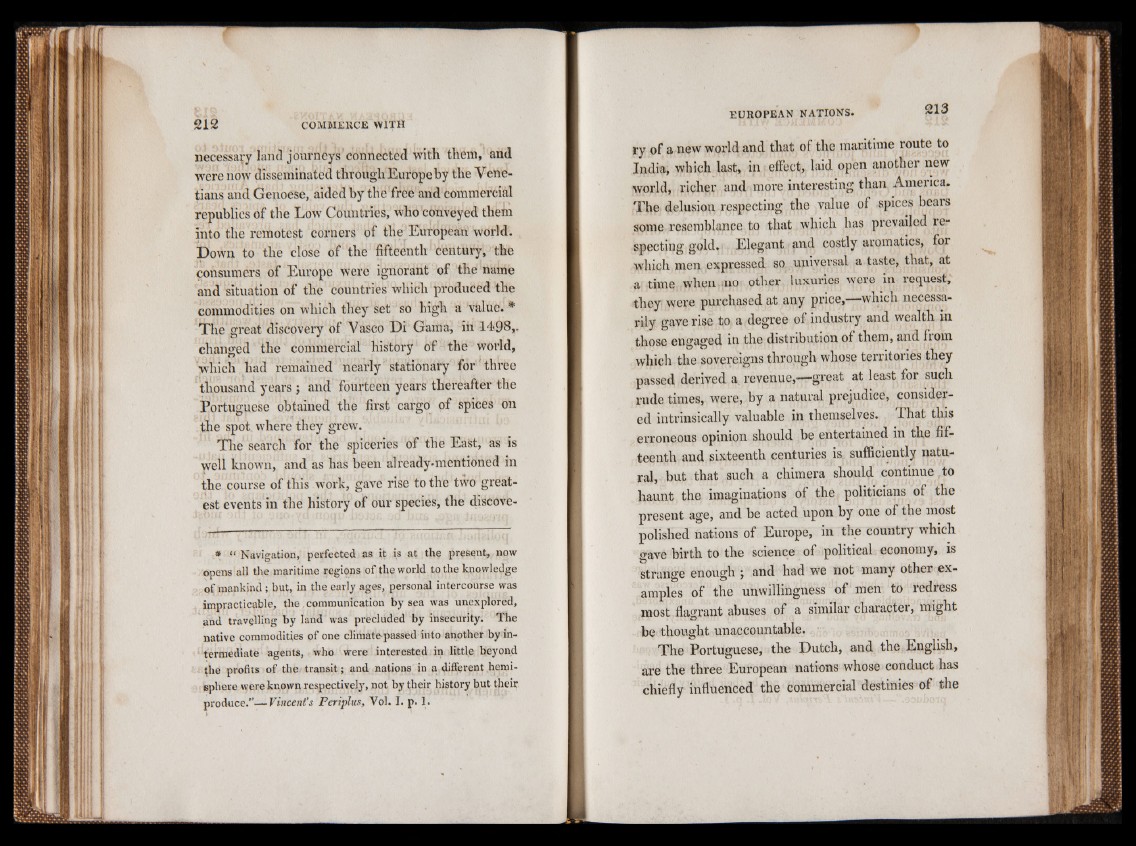
necessary land journeys connected with them, and
were now disseminated through Europe by the Venetians
and Genoese, aided by the free and commercial
republics of the Low Countries, who conveyed them
into the remotest corners of the European world.
Down to the close of the fifteenth century, the
consumers of Europe were ignorant of the name
and situation of the countries which produced the
commodities on which they set so high a value. *
The great discovery of Vasco Di Gama, in 1498,.
changed the commercial history of the world,
which had remained nearly stationary for three
thousand years ; and fourteen years thereafter the
Portuguese obtained the first cargo of spices on
the spot where they grew.
The search for the spiceries of the East, as is
well known, and as has been already-mentioned in
the course of this work, gave rise to the two greatest
events in the history of our species, the discove*
“ Navigation, perfected as it is at the present, now
opens all the maritime regions of the world to the knowledge
of mankind ; but, in the early ages, personal intercourse was
impracticable, the communication by sea was unexplored,
and travelling by land was precluded by insecurity. The
native commodities of one climate-passed into another by intermediate
agents, who were interested in little beyond
the profits of the transit; and nations in a, different hemisphere
were known respectively, not by their history but their
produce.”— Vincent’s Periplus, Vol. I. p. 1.
ry of a new woi’ld and that of the maritime route to
India, which last, in effect, laid open another new
world, richer a n d m o r e interesting than America.
The delusion respecting the value of spices bears
some resemblance to that which has prevailed respecting
gold. Elegant and costly aromatics, for
which men expressed so universal a taste, that, at
a time when no other luxuries weie in rcijuest,
they were purchased at any price,—which necessarily
gave rise to a degree of industry and wealth in
those engaged in the distribution of them, and fiom
which the sovereigns through whose territories they
passed derived a, revenue,—great at least for such
rude times, were, by a natural prejudice, considered
intrinsically valuable in themselves. That this
erroneous opinion should be entertained in the fifteenth
and sixteenth centuries is sufficiently natural,
but that such a chimera should continue to
haunt the imaginations of the politicians of the
present age, and be acted upon by one of the most
polished nations of Europe, in the country which
gave birth to the science of political economy, is
strange enough j and had we not many other examples
of the unwillingness of men to ledress
most flagrant abuses of a similar character, might
be thought unaccountable.
The Portuguese, the Dutch, and the English,
are the three European nations whose conduct has
chiefly influenced the commercial destinies of the